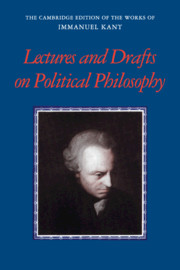Book contents
- Frontmatter
- Contents
- General Editors’ Preface
- Acknowledgments
- General Introduction
- Translators’ Remarks
- Reflections on the Philosophy of Right
- Natural Right Course Lecture Notes by Feyerabend
- Drafts for Published Works
- Drafts for Theory and Practice
- Drafts for Towards Perpetual Peace
- Drafts for the Metaphysics of Morals
- Drafts for Conflict of the Faculties
- Glossary
- Topical and Chronological Concordance
- Editorial Notes
- Index
Drafts for Theory and Practice
Published online by Cambridge University Press: 10 December 2020
- Frontmatter
- Contents
- General Editors’ Preface
- Acknowledgments
- General Introduction
- Translators’ Remarks
- Reflections on the Philosophy of Right
- Natural Right Course Lecture Notes by Feyerabend
- Drafts for Published Works
- Drafts for Theory and Practice
- Drafts for Towards Perpetual Peace
- Drafts for the Metaphysics of Morals
- Drafts for Conflict of the Faculties
- Glossary
- Topical and Chronological Concordance
- Editorial Notes
- Index
Summary
Loses Blatt C 07 (1792–August 1793). Loses Blatt C 07 is composed of unrelated notes that appear in different volumes of the Academy edition. The first page consists of a discussion of the cosmological argument, which flows into a discussion of the ontological argument and the nature of reality and was printed in Volume 18 as R6324 (18:643–47). This is followed in C 07 by material identified as drafts for “Theory and Practice,”which Adickes planned to include in Volume 23 (18:643, note). As it turns out, Adickes's successor as editor of Volume 23, Gerhard Lehmann, failed to include the first few paragraphs of this material from page one when he presented other material from C 07 in Volume 23. Werner Stark included this overlooked material in Nachforschungen zu Briefen und Handschriften Immanuel Kants (Berlin: Akademie Verlag, 1993) pp. 244–45. The selection below, then, begins with the initial portion of C 07 on Theory and Practice using the pagination in Stark, Nachforschungen, and continues immediately with the remainder of C 07 from Volume 23.
[first page]
The principles of freedom, equality, and independence for each member of the state hold by themselves and do not depend at all on old contracts or unilateral taking possession, thus not on empirical conditions whose actuality and conformity with right cannot be proven by identifying the first rightful acts. Yet the constitution in accordance with these principles, one that specifies how everyone's mine and yours ought to be determined and protected, does depend on empirical grounds, namely the receptivity that human beings have to such a first arrangement. Now those principles cannot in any way be rejected and denied as illusory (metaphysically) and unfeasible, indeed they cannot even once be curtailed, because they are duties that stem from reason and they must thus also be assumed to be unavoidable as a basis for action, and so the originally subjective temporary arrangements of convenience are valid until all enter into the condition in which these principles can be fulfilled. This fulfillment must itself lie as the germ of the existing state constitution and so it cannot be thrown out to establish another, because this kind of forceful activity would be contrary to right.
- Type
- Chapter
- Information
- Kant: Lectures and Drafts on Political Philosophy , pp. 191 - 202Publisher: Cambridge University PressPrint publication year: 2016
- 2
- Cited by

